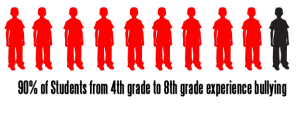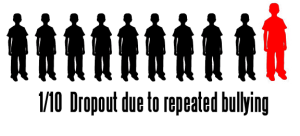Freshman London O’Connell waited a very long time for this moment. This was all she wanted. Even though she accepted that this would not solve all of her problems, she knew it would change so much. The countdown ended and it was time. London prepared to go into surgery, but she wasn’t nervous at all.
O’Connell was born with condylar resorption and faced bullying about her appearance since sixth grade. Bullying remains a national epidemic, which negatively affects its victims leading to anxiety, depression and even suicide. Students all over America face bullying everyday in different forms and it continues to evolve as a serious problem.
“The bullying was the reason I realized I had something wrong.They bullied me to my face and then laughed about it,” O’Connell said. “It was just luck there was something to fix it.”
Bullying changes each year as children grow older. According to dosomething.org, verbal bullying remains constant throughout all of a student’s academic career, while physical bullying begins in elementary school, peaks in middle school and declines during high school.

“I’ve known the people who bullied me since sixth grade,” O’Connell said, “but the bullying was worse at Jobe.”
Males and females bully in different ways. People hold the assumption that males are more aggressive than females, but according to Kaj Bjorkqvist, a researcher, females can be just as aggressive as males. Females do not necessarily excel in physical bullying but rather in verbal bullying, mind games, manipulation and online bullying. Females, unlike males, target their closest relationships instead of strangers and they tend to have a great understanding of empathy and use it to their advantage as a weapon against their victims. According to Curiosity.com, male bullying has changed in some ways, including bullies who act as gang leaders, with a group of people who do their bidding and bully others when the bully tells them to. This new information shows that males are more socially adept when it comes to bullying than what was once thought.
“Most of [the bullies] were guys,” O’Connell said. “ They were normal people, I wasn’t even really close to them.”
According to Joseph Wright, chair of the American Academy of Pediatrics Violence Prevention Subcommittee, bullying can affect a victim’s social life and can result in the victim feeling alone and leave them with low self confidence. According to Marlene Snyder PhD, parents should recognize the signs that their child may be experiencing bullying and contact the child’s teachers. London’s mother, Lorie, contacted her principal at Jobe and politely confronted one of the bullies that bullied London.
“When you’re parents, you’re always taught to turn the other cheek, and that’s what we first told her, but then it never stopped,” London’s mother, Lorie said.
Positive support from friends and family aids victims dealing with bullying. For O’Connell, freshman Hannah Morrell became her friend in eighth grade and advised her when she most needed it.
“It hurt me a lot to hear about [it],” Morrell said. “I told her to not let it get to her and to stay positive. Kids are cruel and will find something to tease about.”
Bullying can result in serious consequences for the victim. According to Randy A. Sansone, MD and Lori A. Sansone, MD, who wrote about the effects of bullying for the US National Library of Medicine, the psychological damage that results from bullying can persist into adulthood. This damage includes depression, anxiety, suicidal ideation and eating disorders such as anorexia and bulimia nervosa. The physical consequences of bullying also go beyond physical damage after an attack from a bully, and includes poor appetite, headaches, sleep disturbances, abdominal pain and fatigue, proving that bullying can be both physically and mentally exhausting for a victim. Victims experience bullying for different reasons, including being overweight or unpopular, but those who are disabled or are handicapped tend to have a higher chance of being bullied.
“My brother is autistic and experienced bullying,” student April* said. “It got so bad he had to change schools.”
Since changing schools, April’s brother feels safer after the bullying ceased. Victims should seek help if bullying persists, and try to take the right measures to ensure their safety and overall well being.

London’s bullying not only affected her, but her family as well. After the persistent bullying at the beginning of the school year, London sought help by going to the counselor, and the bullying stopped soon after. London’s life changed more than just the cease in the bullying she experienced for so long; London decided to get surgery to fix her chin.
“I wanted to get the surgery once I figured out it could be fixed,” London said.
London had surgery at Children’s Medical Center in Dallas. The surgery lasted five and a half hours and went relatively well, although her jaw was fractured during the surgery, mainly because her jawbone was breaking down due to her condition. When she woke up from surgery, she was surprised to find that her jaw would be wired shut for six weeks. Those six weeks were a challenge for her, but she had come so far. London recuperated with the help of her family and her friends, including Hannah. The results of her surgery weren’t as noticeable at first because of the swelling, but as the swelling went down she was able to see the results more and more.
“I definitely feel more confident,” London said. “It makes me feel like I don’t have to hide anymore.”
Since her surgery, London has not experienced any bullying, and even received compliments from some of the bullies who used to bully her. London embraces all of these changes in her life and openly shares them with others, showing how far she has grown since being bullied.
“Now, I look at [the situation] as a positive. I got through it and its made me stronger,” London said.
*Name was changed.






